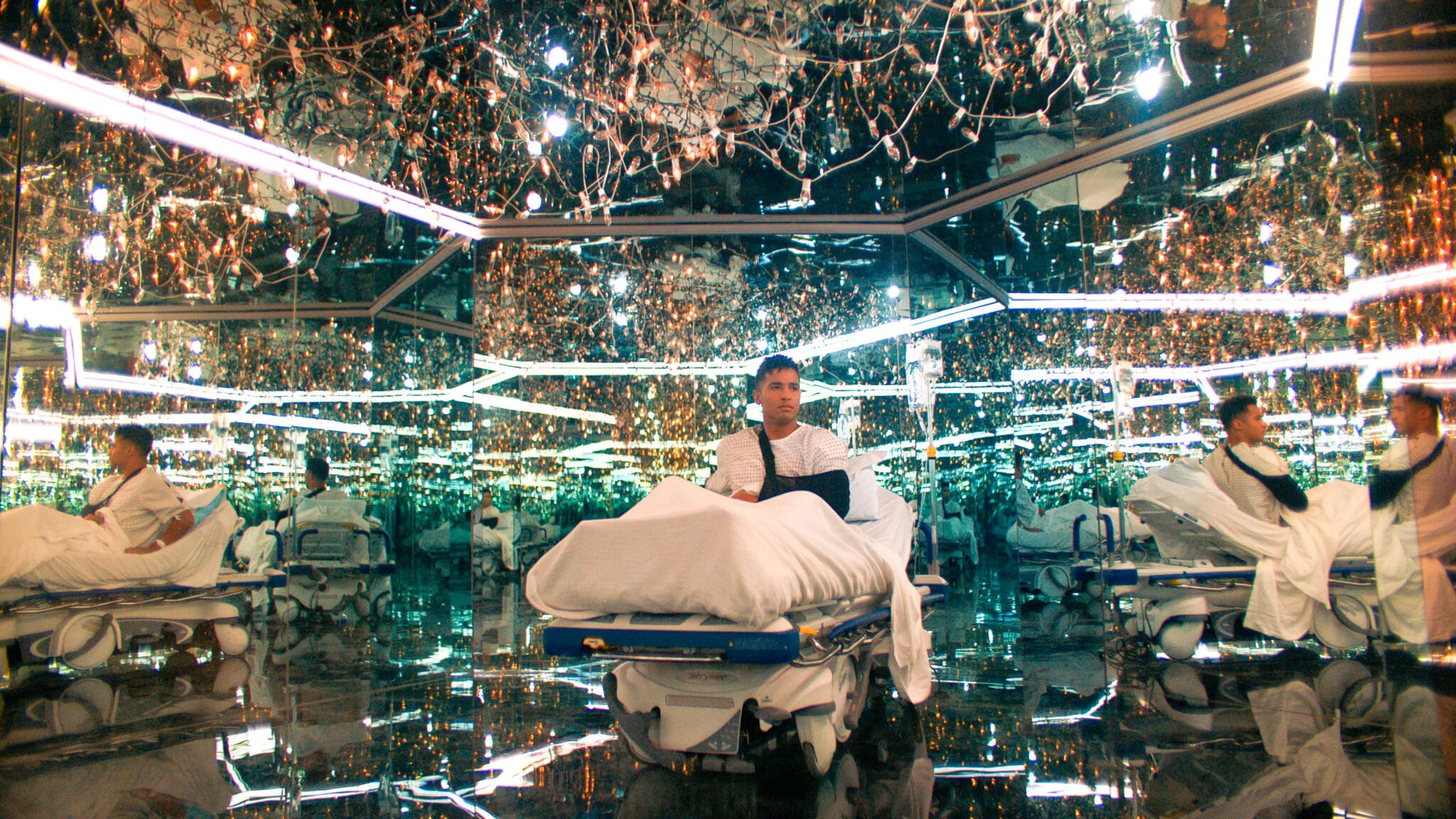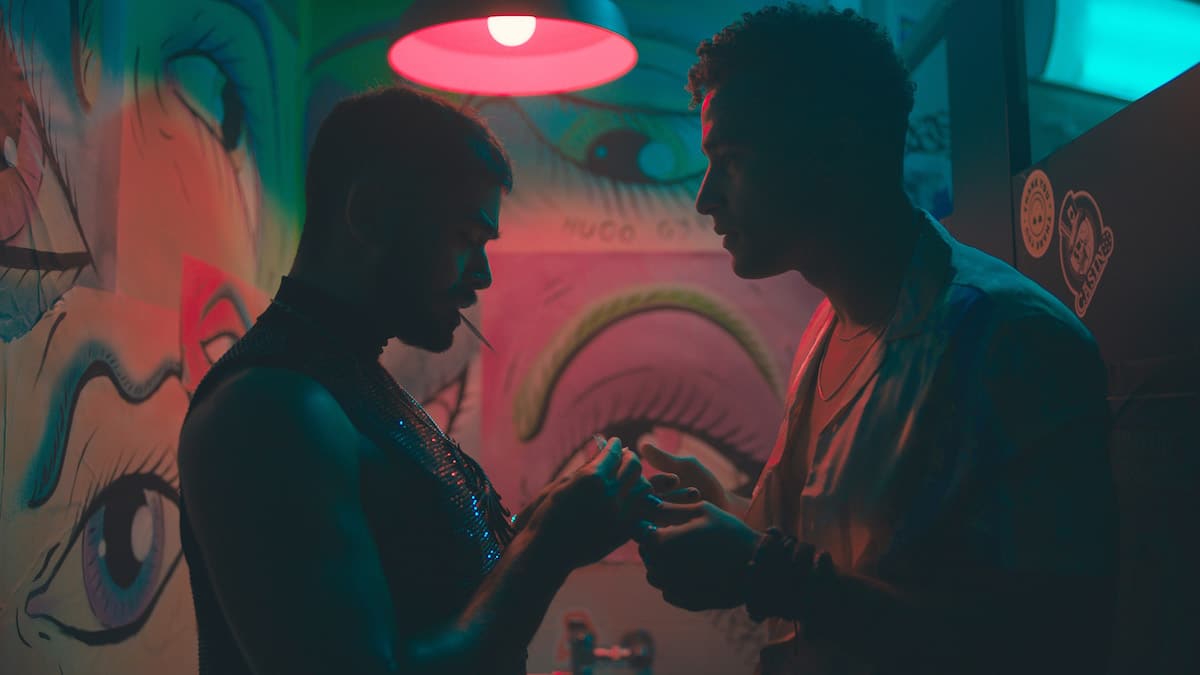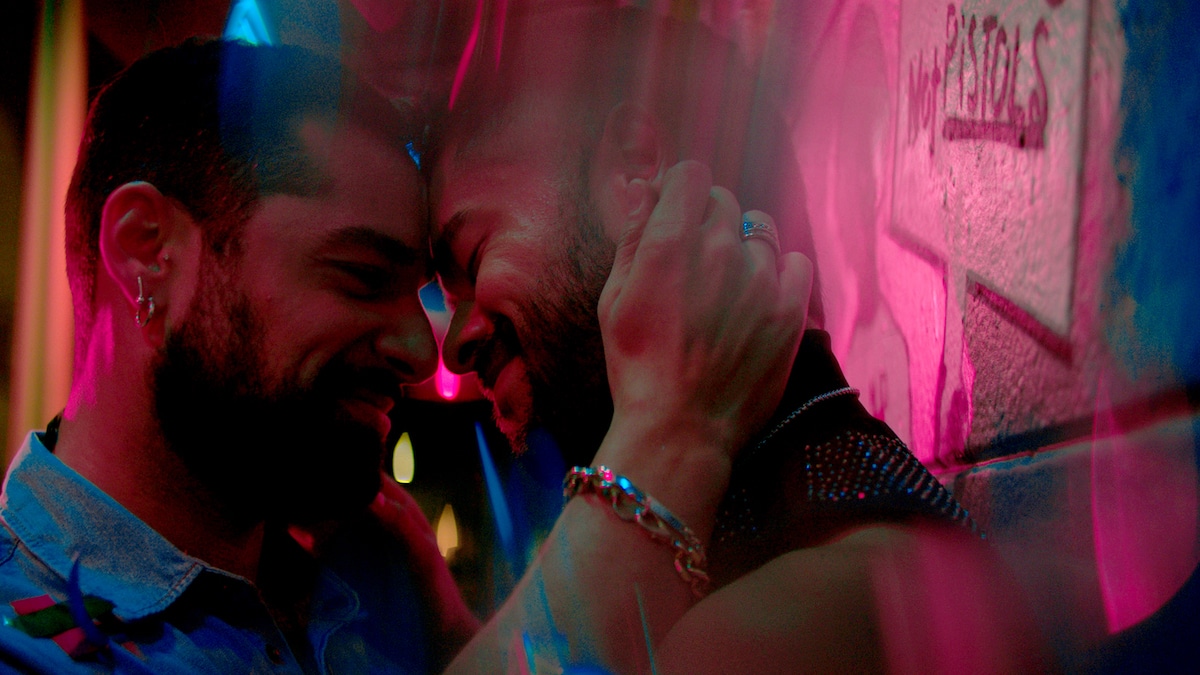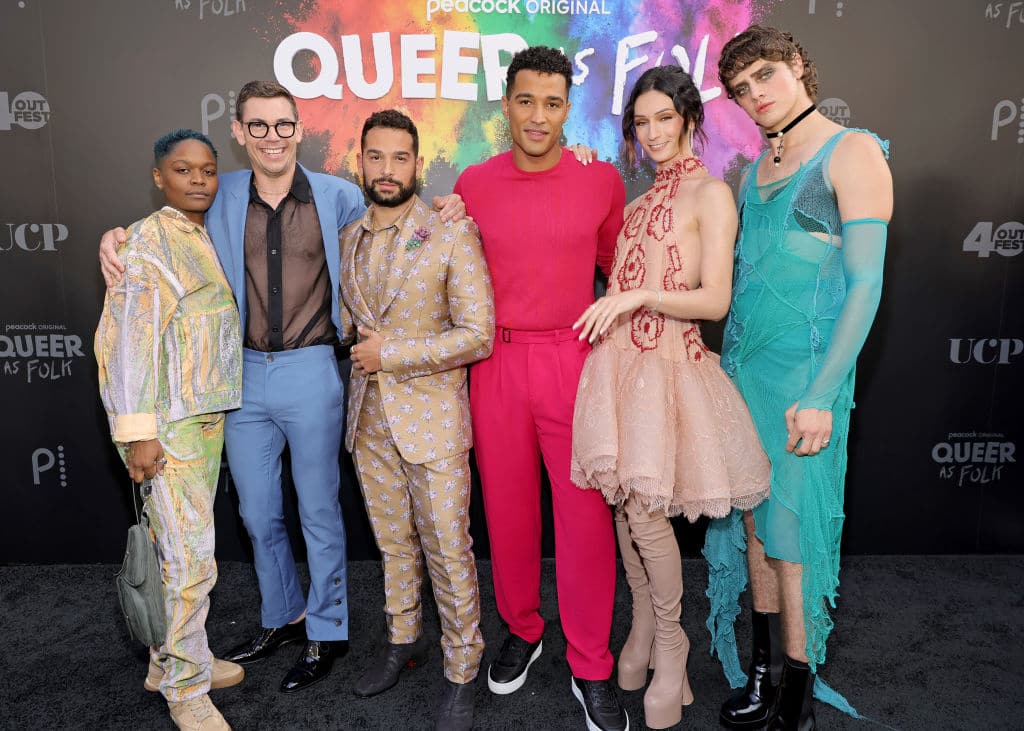Queer as Folk cast explain how reboot ‘honours’ victims of Pulse massacre without ‘sensationalising’

Devin Way as Brodie, Johnny Sibilly as Noah. (Peacock)
In June 2016, a gunman walked into a gay nightclub in Orlando, Florida, and killed 49 people.
At that time, the Pulse nightclub massacre was the deadliest mass shooting in the history of the United States. It sent a bolt of fear through America’s LGBTQ+ community, serving as a terrifying reminder that they weren’t safe even in the spaces that were created for them.
Six years on, that horrific incident has inspired a new take on the iconic TV series Queer as Folk. The rebooted series begins with a similar, fictionalised shooting, using tragedy to explore the bonds and frictions felt among a diverse, tight-knit group.
Devin Way and Johnny Sibilly play the on-off couple at the centre of the cast, Brodie and Noah. They told PinkNews they feel “privileged” to retell the story of Pulse, to share something that could be “healing” and filled with the kind of queer joy that can never be defeated.
PinkNews: The original Queer as Folk has such a special place in people’s hearts, but it wasn’t as diverse as it could have been. Were you excited to champion the breadth and depth of the LGBTQ+ community in this new version?
Devin Way: The first iterations were so impactful and important to so many people. Johnny used a phrase earlier, he said, “We got to watch a show that loved like us, and now we get to watch a show that looks like us.” For me it was really exciting to continue the story and broaden the spectrum. People have messaged us and said, “I finally feel seen – I’ve never seen myself before.” If that’s all we did then that’s everything.
Johnny Sibilly: It’s also such a testament to where we were versus where we are now. To be able to see these stories being told in this way, it really shows that shows like Queer as Folk back in 1999, 2000, were able to move us ahead so we can exist in the space that we’re in now. That’s why we say, if there’s a Queer as Folk years from now, I hope that they can say, “Oh wow, they didn’t even cover the half of it,” because then we would know that we were doing our jobs of moving the needle forward.

Devin Way as Brodie. (Peacock)
The show kicks off with a mass shooting – what was it like for both of you going into that storyline? It’s so close to all our hearts in the LGBTQ+ community given the Pulse nightclub shooting.
Johnny: Yeah, I mean I felt the privilege of a responsibility to tell this story in a way that felt respectful and true of the queer experience. A lot of times Hollywood tells our stories and sensationalises things and tries to focus on the things that we’re not really trying to focus on. I think in our iteration what we want to show is the healing and the fact that there is community even in the face of danger and the face of hate towards us. It’s the family, it’s the community, that have our back.
We weren’t doing an exact reenactment, but if you put things together it was very similar. I just remember where I was and how I felt for those weeks and months after Pulse and thinking, “I have a responsibility to honour those people that we don’t have here anymore, not only in Pulse but in all of the senseless acts of violence that queer people face,” so it definitely felt like a privilege as an artist to tell this story in a way that was respectful.
Devin: One of my favourite quotes is: “The greatest risk we’ll ever take is by far to stand in the light and be seen as we are.” The unfortunate reality is that… in the US alone, [it feels like] there’s a shooting every other day. We didn’t tell this story to sensationalise anything or to take advantage of a situation, it was simply our reality. It’s so close and it’s in us because it affected us. That’s simply the truth… Our story isn’t one about tragedy – our story is about healing. It’s about self-discovery. It’s about re-discovery. So much of the queer experience is rediscovering who we are after being separate from who we thought we were for so long.

Chris Renfro as Daddius, Devin Way as Brodie in Queer as Folk. (Peacock)
The show touches on the trauma experienced by the characters who survive the shooting. What was it like filming some of those scenes that explore the aftermath?
Devin: I think one of the first scenes that comes to mind is in episode two. Brodie has a panic attack in the mall. For me, I never thought about how trauma, it really stays with you and can affect your everday life. This was a functioning mall, by the way [laughs], so there were actual shoppers in this mall! To walk around, to see how crowds now or lights or certain sounds can send people who have gone through tragedy into a panic… it was really eye-opening but it also broke my heart. As the actor having to go through this, it made me really sad that these stories have to be told. It made me really emotional that the world doesn’t just get to be rainbows and butterflies and sparkles – this pain does exist and it exists for so many people. There was a reverence and a respect that came along with that, but it was definitely not without heartbreak.
Johnny: You can’t really ever put yourself in the shoes of someone who’s been through something like that unless you’ve been there, but it is inherently queer to go through trauma and understand the ways in which trauma manifests itself… It’s not trying to act as if you could ever understand, but [it’s to] try to understand as much as you can, as much as your experience allows. But it is, like Devin said, a massive responsibility, and I would say a privilege, especially as a queer person, to tell other queer people’s stories in ways that are real and authentic.

Johnny Sibilly as Noah, Chris Renfro as Daddius in Queer as Folk. (Peacock)
There’s also so much joy in this show, specifically around the idea of chosen family. Was it important for you to show that side of the queer experience too?
Johnny: Yeah, I mean one of the things that always frustrated me about when Hollywood would tell our stories is that a lot of times they would just focus on the grief, they would just focus on the victimisation of queer people. But you can’t talk about queer people without talking about our queer joy that we have in spite of everything that we go through. It’s almost like a breath of fresh air when we meet each other, when we finally connect with like-minded individuals that have gone through experiences we’ve gone through…
Devin: Yeah, I mean the original definition of gay was “happy”, so to get to embody being gay, being happy, it’s necessary. People can say queerness is birthed from tragedy, but it’s also this phoenix of joy that comes from all of us when you get to be at a drag show and you see a drag queen performing – there’s this electric energy that comes out of you when a queen’s slaying Whitney Houston! Any type of queer entertainment is an embodiment of the spirit and it feels like this uncontrollable possession when queerness comes upon you.

CG, Ryan O’Connell, Johnny Sibilly, Devin Way, Jesse James Keitel and Fin Argus attend Peacock’s “Queer As Folk” World Premiere Event. (Amy Sussman/Getty)
This show feels so timely given recent legislative attacks on the LGBTQ+ community. Did you feel that weight of responsibility in making Queer as Folk?
Johnny: Yeah I mean it mirrors it so perfectly. When you watch the first episode these people are at their most joyous time, they’re watching a drag show, everyone’s getting their life and then boom, tragedy strikes, and that’s how it happens for queer people all the time. The last administration that just left, we were finally able to breathe just for a second and then all of a sudden – boom, boom, boom, all of this legislation continues to keep happening. When they see us thriving, when they see us enjoying who we are in media, in spaces that we might not have occupied before, that is when they come the hardest because they know we’re powerful… So it did feel like a responsibility but it also felt like, this is who we are.
Devin: You know, it’s like Denzel [Washington] said, “When you’re at your highest, that’s when the devil comes for you.” It’s just like what Johnny was saying, when we get the wind under our wings and we’re elevated, that’s when someone comes and knocks us down.
Queer As Folk premieres on July 1 in the UK on STARZPLAY.
PinkNews also spoke to the show’s writer, Stephen Dunn, about working with ultimate ally Kim Cattrall, and to actors Jesse James Keitel and CG about why the reboot is a big “f**k you” to transphobes.

